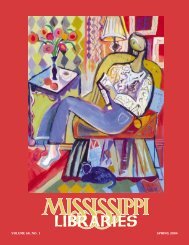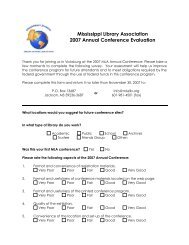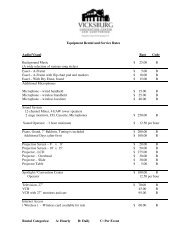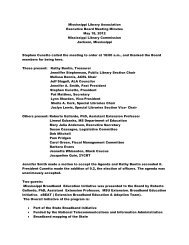Full Text (PDF) - Mississippi Library Association
Full Text (PDF) - Mississippi Library Association
Full Text (PDF) - Mississippi Library Association
Create successful ePaper yourself
Turn your PDF publications into a flip-book with our unique Google optimized e-Paper software.
Page 4 Vol. 75, No. 1, Spring 2012 <strong>Mississippi</strong> Libraries<br />
Competencies, Outcomes, and Targeted<br />
Groups<br />
The James H. White <strong>Library</strong> will offer<br />
four sequenced modules linked to core<br />
courses. The first three modules are linked<br />
to freshman and sophomore 01 and 02<br />
level courses contingent upon the level of<br />
instruction requested by faculty.<br />
Performance Outcomes<br />
Class 1: Linked to Freshman Seminars<br />
Students will be able to:<br />
Demonstrate awareness of library collections<br />
and services<br />
Use the Internet to access the library’s<br />
Web page<br />
Use the library’s Web page to access<br />
appropriate information resources<br />
Use the library’s catalog to find<br />
resources in various formats and locations<br />
in the library<br />
Conduct a catalog search using author,<br />
title, keyword, or subject<br />
Identify location and call number of various<br />
information resources<br />
Class 2: Linked to English 101 and 102<br />
and Public Speaking 201<br />
Students will be able to:<br />
Use the library’s Web page to access<br />
electronic databases<br />
Select the appropriate databases for<br />
specific topics<br />
Differentiate between searching topics<br />
by keyword and by subject<br />
Construct and conduct an advanced<br />
search using Boolean operators<br />
Select relevant articles from search<br />
retrievals<br />
Identify parts of the citation to determine<br />
the availability of articles<br />
Class 3: Linked to English 102 and Public<br />
Speaking 201<br />
Students will be able to:<br />
Select topic keywords/concepts<br />
Identify relations terms and/or other<br />
forms of words (e.g., truncation)<br />
Construct search strategies using keywords/concepts<br />
(and/or quotations)<br />
Implement search strategies in appropriate<br />
electronic databases<br />
Use the online help options found in<br />
databases<br />
Analyze search results and revise if needed<br />
Class 4: Linked to upper-level courses<br />
(seniors and graduate students)<br />
The following student outcomes for<br />
Class 4 serve as a framework, which may<br />
require modifications/alterations for specific<br />
disciplines. Librarians will work in<br />
conjunction with faculty to ensure that students<br />
will achieve requisite skills as outlined<br />
in classes 1-3. These outcomes<br />
require a minimum of three library sessions.<br />
Students will be able to:<br />
Develop search strategies using<br />
advanced techniques (e.g., nesting,<br />
proximity, truncation, NOT, adjacency,<br />
wildcard)<br />
Distinguish between catalogs, databases,<br />
indexes, and the Internet as examples<br />
of the complex nature of the information<br />
environment<br />
Distinguish among various categories<br />
of information resources (e.g., scholarly,<br />
trade, popular, primary sources,<br />
technical reports)<br />
Conduct a refined search appropriate<br />
for the databases selected<br />
Conduct an advanced search on the<br />
Internet<br />
Utilize online help functions<br />
Utilize evaluation criteria on all retrieved<br />
resources<br />
Identify controlled vocabulary when<br />
appropriate<br />
Identify resources not owned by the<br />
James. H. White <strong>Library</strong> and determine<br />
the most efficient way to retrieve them<br />
Identify an accrediting body appropriate<br />
to the discipline<br />
Select and use traditional resources for<br />
Table 1.<br />
the discipline<br />
Select appropriate databases for the discipline<br />
Locate instructions for remote access to<br />
library resources<br />
Locate style formats for scholarly publication<br />
appropriate for the discipline<br />
Demonstrate awareness of the scholarly<br />
communication process<br />
Demonstrate an awareness of plagiarism<br />
Instructional Models<br />
The library will utilize three instructional<br />
methods, but will continue to evaluate<br />
and plan for new instructional delivery<br />
methods as they become necessary. In<br />
course-integrated instruction, the library<br />
will offer a traditional one-time class taught<br />
by librarians. These sessions will be either<br />
discipline specific or provide general information.<br />
All sessions will be initiated by<br />
teaching faculty with an assignment stressing<br />
a specific information literacy competency.<br />
In one-to-one librarian consultations,<br />
the library will offer individual consultation<br />
to MVSU faculty, staff, and students<br />
to give specific help with various<br />
subjects for research purposes. In a forcredit<br />
course, the library will offer an elective<br />
information literacy course that is centered<br />
on utilizing the library and enhancing<br />
research skills. This is expected to be a<br />
one- or three-credit hour course for an<br />
entire semester.<br />
Assessment<br />
Learning outcomes are defined in table<br />
1 for the information literacy education<br />
LEARNING OUTCOMES FOR INFORMATION<br />
LITERACY EDUCATION AWARENESS PROGRAM<br />
STUDENT LEARNING OUTCOMES<br />
1. Students articulate information need and construct research question<br />
or thesis statement (ACRL Standard 1)<br />
2. Students identify appropriate research tools and construct and<br />
implement effective search strategies (ACRL Standard 2)<br />
3. Students examine, compare, and evaluate information sources<br />
(ACRL Standard 3)<br />
4. Students integrate new and prior information by paraphrasing in a<br />
manner that supports the purpose of the product (ACRL Standard 4)<br />
5. Students construct bibliographies or work cited entries using the<br />
appropriate citation style for discipline (ACRL Standard 5)<br />
MEASURE<br />
Class 1 homework assignment<br />
Class 3 homework assignment<br />
Class 2 homework assignment<br />
Class 2 homework assignment<br />
Class 3 homework assignment<br />
Research strategies worksheet














